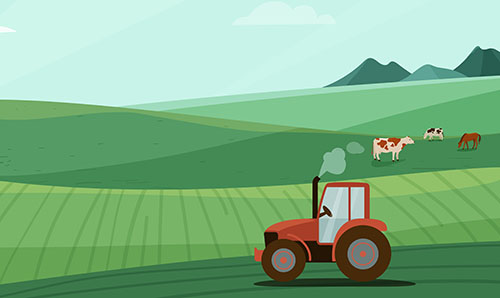Let’s Celebrate Tennessee Agriculture Literacy Week
Nov 16, 2021

The importance of agriculture is beyond what many kids can comprehend. Unfortunately, not all kids have the opportunity to experience the farming lifestyle or to see the farm-to-table process. Unless we take the time to educate our children, they will never develop an appreciation for where their food comes from and the work that goes into getting that food into our grocery stores, school cafeterias, and kitchens.
“With less than two percent of our population actively involved in production agriculture, many students have no firsthand knowledge of how food is raised and produced,” stated Julie Giles, Executive Director of the Farm Animal Care Coalition of Tennessee (FACCT) and event co-chair. “Tennessee Agriculture Literacy Week is a great opportunity to focus on agriculture and share valuable information in our local schools about how farmers grow and harvest the products that provide food, fiber, and fuel for our country.”
During this week-long event, all segments of Tennessee’s agriculture industry come together to promote agricultural awareness and provide guidance and opportunities for new agriculture literacy programs in school systems. Agricultural advocates such as farmers, ranchers, industry representatives, and 4-H and FFA students pay special visits to local schools across the state to share their knowledge and experience and to read agriculturally-themed books.
Students will also benefit from hands-on lessons and follow-up activities. Visit Tennessee Ag Literacy’s website for virtual resources such as videos, books, lessons, activities, and more that are clearly organized by grade and agriculture topic area. For even more “at-home learning” resources, visit the American Farm Bureau Foundation for Agriculture. You will find multiple agriculture and farming book suggestions and activities for kids to explore healthy eating and to learn where their food comes from.
Last year, nearly 8,000 students were reached in all 95 counties in Tennessee, and we believe we can do even better this year with your support and participation. If you have any questions, we encourage you to reach out to Julie Giles at juliefacct@gmail.com or by filling out the form here.
For more content like this, check out the latest issue of the Cooperator.
“With less than two percent of our population actively involved in production agriculture, many students have no firsthand knowledge of how food is raised and produced,” stated Julie Giles, Executive Director of the Farm Animal Care Coalition of Tennessee (FACCT) and event co-chair. “Tennessee Agriculture Literacy Week is a great opportunity to focus on agriculture and share valuable information in our local schools about how farmers grow and harvest the products that provide food, fiber, and fuel for our country.”
During this week-long event, all segments of Tennessee’s agriculture industry come together to promote agricultural awareness and provide guidance and opportunities for new agriculture literacy programs in school systems. Agricultural advocates such as farmers, ranchers, industry representatives, and 4-H and FFA students pay special visits to local schools across the state to share their knowledge and experience and to read agriculturally-themed books.
Students will also benefit from hands-on lessons and follow-up activities. Visit Tennessee Ag Literacy’s website for virtual resources such as videos, books, lessons, activities, and more that are clearly organized by grade and agriculture topic area. For even more “at-home learning” resources, visit the American Farm Bureau Foundation for Agriculture. You will find multiple agriculture and farming book suggestions and activities for kids to explore healthy eating and to learn where their food comes from.
Last year, nearly 8,000 students were reached in all 95 counties in Tennessee, and we believe we can do even better this year with your support and participation. If you have any questions, we encourage you to reach out to Julie Giles at juliefacct@gmail.com or by filling out the form here.
For more content like this, check out the latest issue of the Cooperator.